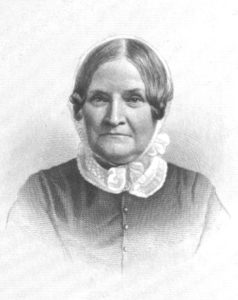
Lydia M. Child
*Lydia Maria Francis Child was born on this date in 1802. She was a white- American abolitionist writer.
Child began writing popular historical novels in her twenties from Medford, Massachusetts. In 1826 she established a periodical for children called Juvenile Miscellany, and her book, The Frugal Housewife 1829, was particularly popular. After hearing William Lloyd Garrison speak at a public meeting in 1831, Child began her involvement in the campaign against slavery. This included her book An Appeal in Favor of that Class of Americans Called Africans 1833.
This book converted people like Charles Sumner to the cause, but upset traditional readers and sales of her other books dropped significantly. She was eventually forced to cease publication of Juvenile Miscellany, and instead, she started with her husband, David Lee Child, a weekly newspaper, the Anti-Slavery Standard. In 1839 Child and two other women, Lucretia Mott and Maria Weston Chapman were elected to the executive committee of the Anti-Slavery Society.
This upset some members of society. Lewis Tappan, the brother of Arthur Tappan, the president of the society, argued that: "To put a woman on the committee with men is contrary to the usages of civilized society." Other leaders, such as William Lloyd Garrison, Theodore Weld, Wendell Phillips, and Frederick Douglass were as committed to women's rights as they were to the abolition of slavery. In 1861 Child controversially helped Harriet Jacobs publish Incidents in the Life of a Slave Girl. At the time, the book was condemned because of the way it dealt with the sexual exploitation of young female slaves. Jacobs was also highly critical of the role of the Church in maintaining slavery.
Child also became concerned about the rights of women and Native Americans. This was reflected in the publication of History of the Condition of Woman in Various Ages and Nations and An Appeal for the Indians. Lydia Maria Child died on July 7th, 1880, in Wayland, Massachusetts.